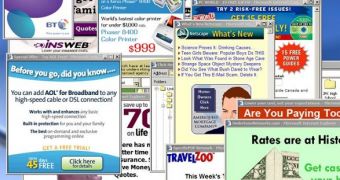Though they only appear on our screen for several seconds, pop-up ads do more than simply annoy us to the fullest. They are also extremely apt at breaking our concentration on the tasks at hand, by breaking the mental processes that keep us focused on our work. Experts at the Economic & Social Research Council have been behind the new investigation, which also reveals that test subjects asked to perform seven simple tasks take longer than usual to do so, if their focus is broken with pop-ups.
“The interruption breaks our cognitive focus on the task in hand, so we have to work out where we were up to and what we were planning to do next before we can resume the task at our original speed,” Dr. Helen Hodgetts, one of the Cardiff University researchers behind the new study, explains. Together with professor Dylan Jones, also at the university, Hodgetts led the study, for the ESRC. The work shows that even a five-second interruption makes subjects slower in completing the next step in a series of tasks. This research raises a number of problems related to efficiency at the workplace.
Hodgetts also says that the experiments were conducted while the participants had only simple tasks to perform. She argues that, in a real-life working environment, the amount of data people need to retrieve and mentally reprocess after such an interruption is a lot greater. Therefore, the amount of damage that pop-ups do may be greater than the results of the paper show. “Our findings suggest that even seemingly brief and inconsequential on-screen pop-up messages might be impacting upon our efficiency, particularly given their frequency over the working day,” the expert says.
The team also believes that one possible method of reducing the bad influence of pop-ups and e-mail alerts would be for the windows themselves to disappear when not responded to. They should also be made smaller, and made to appear at locations that do not obstruct the worker's view on the original information. These steps, the Cardiff experts say, could contribute to efficiency, minimizing the time it takes people to get past unsolicited information.

 14 DAY TRIAL //
14 DAY TRIAL //